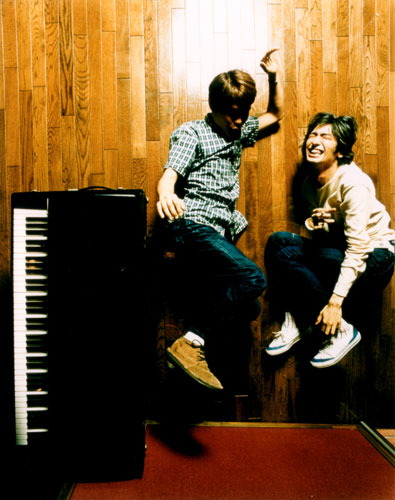The charm of following a polymathic musician is in the phases they experience, always casting off their previous manifestations as definitive statements on their transitory fancies
In 1995, Mari 'Kahimi Karie (カヒミ・カリィ)' Hiki and Keigo 'Cornelius (コーネリアス)' Oyamada were in something of a shared romantique nostalgia, or a relationship, to you and I. The Girlfriend was something of a sylph with a singing voice more incisively described as an airless, tranquil whisper, whose luminescent face, stoic demeanour and protean imagery that included Rococo opulence, French Mod Sex Kitten and Tokyo demureness made her a star; The Woman of a Thousand Fantasies, if you will
The Boyfriend was running one of the trendiest yet most substantive record labels in the world - Trattoria Records - touring, remixing, producing and playing when he could and collaborating on portable record players, G-Shock models and other playthings that bore his brand. His latest incarnation at that time was an idiosyncratic bouillabaisse of 1960s psychedelia, 1970s heavy metal (he was a self-taught guitarist who developed through playing Kiss records), 1980s hip hop and 1990s electronic noise; at once the classic Japanese refiner of Western developments and the alien refractor of cultural traditions that he interacted with from afar
Today's selection shows them in a very deliberate Gainsbourg and Birkin-like reverie; aside from their romantic status at the time, Karie can also speak French and English, and the 1960s and 1970s were rather a la mode in the Shibuya-Kei landscape of foreign musical history made modern day blended pop. Oyamada has long been an arbiter at home; his diverse musical knowledge threaded itself through every record he was involved in, no matter what year it was
In either flavour, 'A Fantastic Moment' is probably one of the most beautiful pieces of music either has released. You barely even notice the Lou Reed sample
A translation:
The Boyfriend was running one of the trendiest yet most substantive record labels in the world - Trattoria Records - touring, remixing, producing and playing when he could and collaborating on portable record players, G-Shock models and other playthings that bore his brand. His latest incarnation at that time was an idiosyncratic bouillabaisse of 1960s psychedelia, 1970s heavy metal (he was a self-taught guitarist who developed through playing Kiss records), 1980s hip hop and 1990s electronic noise; at once the classic Japanese refiner of Western developments and the alien refractor of cultural traditions that he interacted with from afar
Today's selection shows them in a very deliberate Gainsbourg and Birkin-like reverie; aside from their romantic status at the time, Karie can also speak French and English, and the 1960s and 1970s were rather a la mode in the Shibuya-Kei landscape of foreign musical history made modern day blended pop. Oyamada has long been an arbiter at home; his diverse musical knowledge threaded itself through every record he was involved in, no matter what year it was
In either flavour, 'A Fantastic Moment' is probably one of the most beautiful pieces of music either has released. You barely even notice the Lou Reed sample
A translation:
We run, cutting straight through the wind
Nothing can stop us as we head straight for hope
We might find it over on that hill maybe, I hope...
La la la when you gently take my hand
Everything around us changes to perfection
All of the world's sunlight shining just for me and you
...And the bugs, they laugh...
...Melting into the ground...
The two of us can do anything. Right?
See, we can even jump over that rainbow.
...And the time stands still...
...The flowers are waving...
The two of us are laughing high above the clouds
Our laughter leaking down as sun beams in the forest
Just now the rain of sadness is turning into a rainbow
Away with the gloom
The grass gently waves
And the birds peacefully fall to sleep
One day...everything...I hope...









